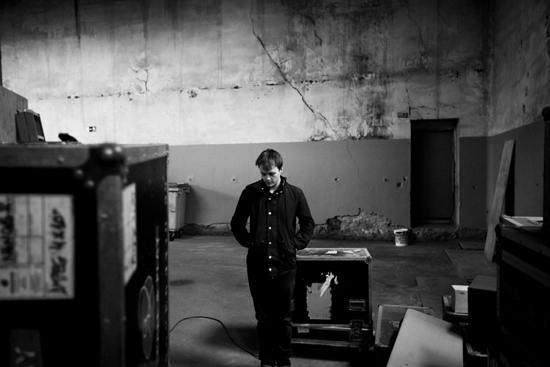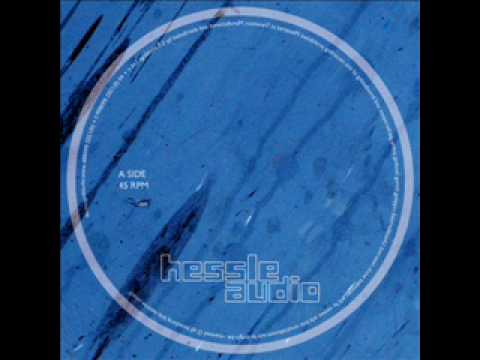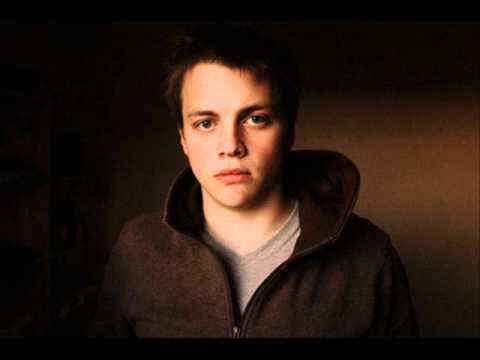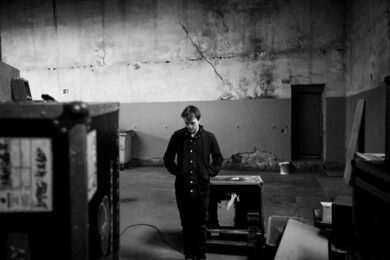It’s been pleasing to witness David Kennedy, aka Pearson Sound, rise to prominence in his field, considering how few compromises his music has made in the six-odd years since he first emerged as Ramadanman. Early singles ‘Blimey’ and ‘Revenue’ were exquisitely peculiar, slippery little things, all knees and elbows, whose tumbling percussion and clipped phrasing posed new questions of a dubstep scene threatening to lapse into rhythmic predictability.
The subtlety that marked out those early productions has remained the defining factor of everything he’s released since, even as dubstep’s meaning has shifted drastically and he and his contemporaries have moved away from those initial stomping grounds. Even what you might call the more anthemic end of his back catalogue – ‘Glut’, with its sing-song vocal motif (later mashed up with S-X’s ‘Woooo Riddim’ for the satisfyingly boomy ‘Woooo Glut’), pistol-crack ghetto house banger ‘Work Them’, or ‘WAD’s saccharine UK-funky-meets-Todd-Edwards – packs an unusual amount of textural detail and variability into its lean frame. And between more obvious club fare he’s taken a varied, if consistently reductionist, approach to composition: in his back catalogue are tracks that disintegrate into nothing as if submerged in an acid bath (‘Stifle’), wild flurries of sliced breaks and tortured rave divas (the exhilarating ‘Don’t Change For Me’), clattering dub techno (‘Humber’), two-and-a-half-minute long breakdowns (‘Tempest’) and, in recent release ‘Footloose’, five minutes that tease up tension to snapping point before cruelly dying away.
The same approach has characterised the output of Hessle Audio, the label Kennedy has run since 2007 with friends Ben ‘UFO’ Thomson and Kevin ‘Pangaea’ McAuley. They’ve maintained a strongly unified aesthetic throughout their tenure that’s been frustratingly hard to pin down, but loose enough to allow Peverelist’s jungle-fried steppers’ techno to sit comfortably alongside Elgato’s ultra-reduced two-step and rhythm-driven noise sketches from Bandshell.
His latest 12", released next week, is his first via Hessle Audio in some time. It’s a slight change in tack again from his more recent club music, whose characteristic clustered kicks and claps were starting to become immediately recognisable as Kennedy’s own. His usual attention to percussive detail is present and correct, but placed in a more abrasive setting that suggests a similar head on clash between grime and techno as recent music by Kowton and Szare. ‘Clutch’ and ‘Piston’, hard and punchy arrays of components that bleed carbon and engine grease, match the mechanical connotations of their names. They sound like the result of a considered change in approach from the slicker surfaces of his 2010 and 2011 output.
"I think people almost started to think there was a particular sound," says Kennedy of the thought process that led into to these new tracks. "I think maybe I was guilty of it in one or two tunes, almost just writing to a bit more of a template – something like ‘Untitled’, for example, had a few elements in there that I fully consciously put in as a signature kind of thing, which in retrospect I’m a bit funny with now.
"I guess when I was sitting writing the tunes that are now on the single," he continues, "it was like ‘It’s time to switch things up a bit’, because my sound has always progressed, from the more tribal-y, ‘Blimey’ kind of stuff, through to the Ramadanman EP on Hessle, the weird experimental stuff, which then found its way through to ‘Work Them’, ‘Glut’ and ‘Blanked’. So I see this single as sort of the next phase in a way. I think the tunes still sound like me, but without having an 808 in them! I’m sort of happy to admit that – that that period’s now passed. I’ve always said, what’s the point in trying to re-make something you’ve already done? Do you know a tune of mine called ‘Project’?"
It’s on your Fabric CD, right?
DK: I remember when I was making it, it was kind of just seeing what I could do using the same elements and similar sounds and stuff. You end up having a tune that I’m into and that I play sometimes, [but] it’s kind of coasting in a way, and that’s obviously a really dangerous thing, in my opinion, as a producer. So I just felt that I had to do something different.
Do you think your overall changing sound is reflective of shifts in your own taste? Does the kind of music you’re listening to feed strongly into what you make?
DK: Kind of. With the grime reference points on this new one, I mean, I’ve always been into grime – from when Dizzee Rascal was in the charts, having a very mainstream 13 year old’s opinion of what grime was, to actually being able to dig a bit deeper when you’re older, with more hindsight on it. So for the last year or so I’ve been getting more into it – just doing research, crate digging, finding all these obscure white labels. I think it has influenced this record, certain sonic characteristics of grime, certain samples – none of which I think I’ve used on this record – little Wiley Game Boy bleeps, and stuff.
I’ve used a couple of sounds that probably are on a couple of old grime tunes, but subconsciously. I’m not trying to make a 2012 ‘Pulse X’ [Musical Mob’s early grime classic], because I didn’t really think that would be bringing anything new to it. Part of the charm of something like ‘Pulse X’ is that it was made in 2001 or whenever it was, and it sounds the way it does, I don’t think it really needs updating. Updating basically just means better production, cleaning it up in a way, which I think kind of misses the point of the original tracks.
That’s one thing I’m wary of, or have difficulty with, in a lot of more formulaic current halfstep dubstep – a lot of the essential rawness and the actual character of the recordings being a bit lo-fi and shittily put together, that was part of the charm, and once that gets stripped out you end up with something that feels frustratingly cleaned up, and has lost most of the magic that was there in the first place.
DK: Yeah, I’m inclined to agree, really. I’ve always said about dubstep, it sort of was its moment, I was lucky enough to be there for some of it, and I personally don’t want to try and recreate what I’ve already enjoyed, because I’d rather do something hopefully a bit different. Someone like Mala has said there’s so much more to explore at 140, which I kind of agree with, it’s just that I’m personally not on doing that at the moment. He’s obviously just come up with this crazy new album [Mala In Cuba] and there’s stuff in there that I’d never even have thought of at 140 – but then someone like him has a completely different outlook on the whole thing.
Something I’ve always been aware of as present in your music is the attention to detail. I mean, one thing I found really interesting with that glut – no pun intended – of tracks you released a couple of years ago, was that they seemed to get you a lot of attention in terms of club play, just because they worked so well on dancefloors, but there was a huge amount of detail in them. Are you quite meticulous with your productions? Do you spend a lot of time on the minute details?
DK: If you’re playing something in a club, it’s sort of a different story. Some of my favourite club records are tracks that basically do the same thing without really any detail for six minutes, or whatever, so a lot of my prototype music – which you’ll pretty much only hear in clubs as I won’t feel it’s ready enough to play on the radio or whatever – will be very rough.
I always see it as filling in the detail. For example with this single, when I decided these were going to be the three tracks in this order, for me it’s part of finishing the tune. It’s tricky, I just sort of listen to it, write down a big list of what I think it needs and keep on rendering the track and listening again, rendering and listening, until I can listen through again and say to myself ‘There’s nothing I want to change in it’. That’s normally how I go about finishing a tune, and it normally involves a deadline [laughs].
There’s a conflict between detail and ending up being fidgety, or you might say ‘IDM’, or glitchy stuff that gets too clever for its own good sometimes – so I try not to drift into that territory – but just a lot of automation, trying to make sure that I’m happy with the finished track. There’s definitely a fine line, I’m always hoping I keep on that. Obviously if you just had five minutes of a sixteen bar loop it would probably get quite boring, even if it was the best sixteen bar loop in the world. [It’s] kind of adding detail and adding interest, but without compromising the overall aesthetic of the tune.
I wanted to move on to Hessle Audio in general, because you’ve obviously got your 12” coming out, and then the Pangaea double EP coming out in October. Do you see the label as an entity that runs slightly parallel or slightly distinct from your DJ sets, or from where your own music might be going? For example, you’d probably hear you play a fair amount of four-to-the-floor house in some of your sets and radio shows, but I can’t imagine ever hearing that sort of stuff coming out on Hessle.
DK: Yeah, it’s a tricky one actually. Sometimes one of us would be like ‘I really like this tune’ and then the other would be like ‘I’m not so sure’ – and we might all end up playing it in our DJ sets at one point or another – but then we’d eventually be like ‘It’s not something for Hessle’. It’s kind of hard to describe. Pretty much all the decisions we’ve ever taken with Hessle have always felt natural in that respect. Even some of the Bandshell stuff I wouldn’t play when I’m playing in a club, but I’m still happy to put it out. It’s the three of us doing the label, and if the other two are especially keen one on thing and I’m especially keen on another thing, all our voices get heard in that sense. I guess it’s democratic in that way.
Do you think it becomes an independent entity from all three of you, just because all three of you are feeding into it?
DK: Yeah, I think so. It’s quite hard to say. I mean, we’ve had people say if we do parties with all three of us playing all night, there’s always a ‘Hessle feel’ to it, which is obviously a really nice compliment, and people might say a tune sounds like a Hessle tune, which I don’t always agree with. I wouldn’t want it to get to the stage where we put out a record and someone said ‘Ah, that was a Ben UFO pick’, or ‘That’s obviously something David chose’ – and I don’t think any of our records do sound like that, because none are ever picked by just one of us.
I imagine that’s its strength. There aren’t that many dance labels that manage to maintain a strong aesthetic that doesn’t feel like a straitjacket, as you guys have managed to.
DK: I always wonder how our own productions, either mine or Kev’s [Kevin McAuley, Pangaea], fit in to the bigger picture of Hessle releases, or if someone who wasn’t us sent those very tracks to us, whether we’d still sign them [laughs]. It’s a bit of an interesting thing.
Maybe what you guys do is a binding aspect too. Throughout the label’s history there’s always been you and Kev coming out with stuff.
DK: I guess we’re never going to run out as long as us two are making music [laughs]. That could be a hindrance, as well – if we started releasing just our own two’s stuff, and everything that ever came out of our computers, it would be a very different story as well.
One thing that again seems to be a strength, or something I find quite heartening in what you’re doing, is the fact that you’ve got an unrushed approach – not doing something for 6 months, then doing it properly when you actually do it. It runs counter to this faster-faster-faster, more-more-more thing that so often happens with the way the internet encourages people to consume music now. You only have three or four 12"s a year, and there’s only a maximum of maybe about 12 tracks to digest.
DK: I think that’s important. Sometimes you just need to give your audience space, because if [a release] comes out, and the day after you’re like ‘We’ve got this [other thing] coming out in a month’, it’s just like, well, hang on, this has just come out, we need to give it a bit of time. It’s partly that. I don’t think we’d ever want to be releasing 12 things a year and doing it like that – you have to give people a chance to get into it. There’s been tunes on other labels that have come out and I haven’t really been into them, but then maybe you’ve heard them in the right context and it’s finally suddenly clicked, and then two months later you buy the record, because you’re like ‘I slept on this, I’ve realised I like it’ [laughs]. It’s giving people the chance to have their own experience with the music.
Have you felt the changing of the scene around you as things have gone on? The way the music’s changed, people dropping in and out, crowds changing – have you felt very much that there’s been a large shift over this period of time you’ve been making music?
DK: It’s kind of been strange actually, because when I was first starting out, getting reviews or getting press, the first thing anyone mentioned was me being young. Which, you know, isn’t really the case any more. You’d always be referred to as ‘newcomer’ or ‘up-and-comer’ or whatever. And I guess the weird thing over the last couple of years that you have to adjust to is that suddenly you’re 23, 24, and you’ve now got 17, 18 year olds coming up and making amazing music and making waves, and you’re like, ok, we’re now getting to more veteran stage! [laughs] It’s like with Skream and Benga, they’re 25, 26, they’re still incredibly young but they’ve been doing this for such a long time that they’ve been in the scene for years.
I guess once you’ve been doing stuff for a while there’s just inevitably going to be less excitement about what you’re doing, there’s less hype and buzz, which is quite refreshing in a way. I think for a lot of these younger guys coming through, recently more and more [they might have] done one or two things, or not even had anything out, and there’s already this incredible expectation, hype, or expectation you should be DJing. I’m lucky enough to have never really had had [that] actually, so I can’t quite imagine what it would be like now if you were 17 and 18 and making music that people wanted to play.
In terms of the scene, obviously coming from something as close knit as dubstep and watching the way things unfolded, I don’t really think there’s been anything to quite replicate that. There hasn’t really been any movement that would really have that same close-knit scene – and you could even argue that that kind of thing might not really even be possible anymore.
I do wonder whether everything’s so atomised that it might not be possible.
DK: Yeah. I mean, in 2005 the internet was just such a different thing as well, and so many different factors in my opinion maybe made dubstep a bit of a perfect storm of scenarios that resulted in the scene. Whereas now there’s a kind of a different community really. There’s still familiar faces from the dubstep scene. [But] I guess it’s a scene of people you meet when traveling, at gigs, or you might hear someone’s record you like and then hit them up and get into contact with them that way. It’s just incredibly different to how it was in 2006. Back then if you met someone who was also into dubstep, you’d kind of immediately be friends. People were so obsessive about this particular type of music back then – [that] doesn’t exist any more. It’s so much more fragmented and so much more international, and a lot of us guys who were in the scene in 2006 or whatever are now either really busy or never around.
I don’t know, maybe there’ll be something in the next few years that solidifies everything a bit more. Maybe there’ll be a new group of 18 year olds out there who are starting their own thing right now which we haven’t even heard of. There probably are, to be honest [laughs].
The Clutch EP is out on 10th September through Hessle Audio
Photo by Dan Wilton





